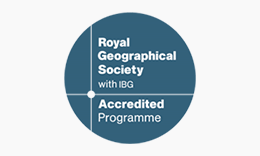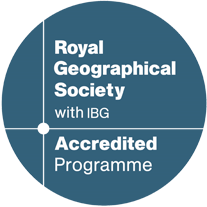Physical Geography (with integrated year studying abroad) Code F845 Attend an Open Day Attend an Open Day Clearing places available – 0800 121 40 80
Apply NowKey Facts
F845-
UCAS Tariff
120 - 96
-
Course duration
4 years
Available for September start 2025
Further details on entry requirements
Apply NowAberystwyth University’s Department of Geography and Earth Sciences is one of the most established and experienced departments of its kind. Aberystwyth University offers you the unique opportunity to study geography in one of the most picturesque locations in Europe and take part in the Integrated Year Studying abroad.
Set on the coast of Cardigan Bay and surrounded by a great diversity of beautiful environments, including marine, moorland, mountain and grassland, the Department of Geography and Earth Sciences is uniquely placed to make the most of the stunning landscapes that surround it, providing you with a fabulous variety of fieldwork and recreational opportunities. This degree accredited by the Royal Geographical Society (with IBG) will equip you with the enhanced skills, abilities and expertise to face and engage with the challenges facing society today.
Course Overview
Modules September start - 2025
Please note: The modules listed below are those currently intended for delivery during the next academic year and may be subject to change. They are included here to give an indication of how the course is structured.
| Module Name | Module Code | Credit Value |
|---|---|---|
| An introduction to Earth Materials | GS12520 | 20 |
| Earth Surface Environments | GS10520 | 20 |
| How to Build a Planet | GS11520 | 20 |
| Life on Earth | GS10720 | 20 |
| Living in a Dangerous World | GS10020 | 20 |
| Researching the World: data collection and analysis * | GS13020 | 20 |
| Module Name | Module Code | Credit Value |
|---|---|---|
| Geography Research Design and Fieldwork Skills * | GS20020 | 20 |
| Geoscience Laboratory Techniques | GS20120 | 20 |
| Glacial and Fluvial Processes * | GS25520 | 20 |
| Quaternary Environmental Change | GS23920 | 20 |
| Visualisation and Analysis of Geographical Data | GS23620 | 20 |
| Chemical Analysis of Natural Materials | GS21010 | 10 |
| Geographical Information Systems | GS23710 | 10 |
| Physical Analysis of Natural Materials | GS22010 | 10 |
| Quantitative Data Analysis | GS23810 | 10 |
Options
| Module Name | Module Code | Credit Value |
|---|---|---|
| Catchment Systems | GS25210 | 10 |
| Environmental Geochemistry | GS20720 | 20 |
| Geographical Perspectives on the Sustainable Society | GS28910 | 10 |
| Geoscience for a Sustainable World | GS22620 | 20 |
| How to Build a Sustainable Society | GS27920 | 20 |
| Physical Geography and Environmental Science Research Design and Fieldwork Skills | GS21120 | 20 |
| Reconstructing Past Environments | GS21910 | 10 |
| The Frozen Planet | GS23510 | 10 |
| Food, Farming, Technology and the Environment * | BR29020 | 20 |
| Fundamentals of Geochemistry | GS22720 | 20 |
| Module Name | Module Code | Credit Value |
|---|---|---|
| Geography Dissertation * | GS34040 | 40 |
Options
| Module Name | Module Code | Credit Value |
|---|---|---|
| Applied Environmental Management | GS31120 | 20 |
| Debates in Climate Science | GS30520 | 20 |
| Environmental geochemistry and biogeochemistry | GS30320 | 20 |
| Glaciers and Ice Sheets | GS33420 | 20 |
| Monitoring our Planet's Health from Space | GS32020 | 20 |
| Volcanic Activity: Hazards and Environmental Change | GS30420 | 20 |
* Also available partially or entirely through the medium of Welsh
Careers
Teaching & Learning
Typical Entry Requirements
UCAS Tariff 120 - 96
A Levels BBB-CCC
GCSE requirements (minimum grade C/4):
English or Welsh and Mathematics
BTEC National Diploma:
DDM-MMM
International Baccalaureate:
30-26
European Baccalaureate:
75%-65% overall
English Language Requirements:
See our Undergraduate English Language Requirements for this course. Pre-sessional English Programmes are also available for students who do not meet our English Language Requirements.
Country Specific Entry Requirements:
International students whose qualification is not listed on this page, can check our Country Specific Entry Requirements for further information.
The University welcomes undergraduate applications from students studying the Access to Higher Education Diploma or T-level qualifications, provided that relevant subject content and learning outcomes are met. We are not able to accept Access to Higher Education Diplomas or T-levels as a general qualification for every undergraduate degree course.
Our inclusive admissions policy values breadth as well as depth of study. Applicants are selected on their own individual merits and offers can vary. If you would like to check the eligibility of your qualifications before submitting an application, please contact the Undergraduate Admissions Office for advice and guidance.


